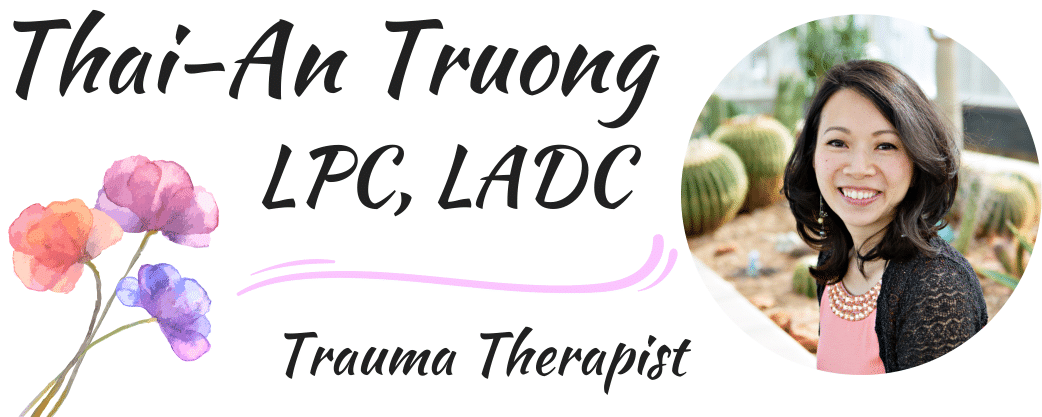In the Media
I've been cited by several sources as a mental health expert on depression, anxiety, and relationships.
Podcasts
Feeling Good Podcast Ep 367: TEAM-CBT for Relationships & Couples
Feeling Good Podcast Ep 344: The Grief Method: Featuring Thai-An Truong
Feeling Good Podcast Ep. 283: The O of OCD: Featuring Thai-An Truong, LPC, LADC
Feeling Good Podcast Ep. 264: How to Get Laid! (With a little help from the 5 secrets of effective communication)
Feeling Good Podcast Ep. 218: Treating Postpartum Depression and Anxiety with TEAM-CBT
Feeling Good Podcast Ep. 187: Live demonstration of using TEAM-CBT to treat depression and social anxiety.
You can listen to these episodes on your podcast player of choice for a more user-friendly listening experience.
My First Radio Interview
Ask the Experts - MetroFamily Magazine
I'm so excited to be writing for the MetroFamily Megazine. The MetroFamily Magazine is a local magazine that has been around since 1998. Their passion has been to help OKC/metro area parents be more successful and have more fun with their families.
June 2021: Postpartum Anxiety – 5 common symptoms + practical ways to begin to heal
April 2020: 5 Common Symptoms of Postpartum Depression
February 2018: Dining out with Baby
January 2018: When should you expect your baby to respond to the word "no?"
November 2017: How to Gracefully Handle Unwanted Advice
Depression
Washington Post: The pandemic’s mental health impact is dangerous for new moms. Especially black moms.
She Knows: Yes, It's Possible to Have Prenatal Depression Too
Motherly: Prenatal Depression is a Thing--A Very Real, Important Thing
Mother Nature Network: Do You Suffer From Smiling Depression?
This is smiling depression, also known as perfectly hidden depression. According to Thai-An Truong, a mental health therapist at Oklahoma's Lasting Change Therapy, the symptoms of smiling depression are similar to those of depression: low mood, sadness, hopelessness, low self-worth, and even suicidal thoughts. The difference, Truong adds, is that people with smiling depression "put on a happy face in front of others," hiding their vulnerability and even using laughter as a means to disguise their pain.
Similarly, if a friend or family member who seems to have it all turns to you for comfort, don't blow them off by telling them to be grateful for what they have. "Others can help by listening to the pain in their words instead of the smile on their face as they throw out jokes about how their life sucks'" said Truong. "Let the person know that they're there to listen and support them."
Romper: 7 Common Habits That Could Be Signs of Depression
Shopping can be fun and a nice distraction, but regularly relying on shopping or spending money to distract you from how you're feeling or what's going on in your life could be sign that you're depressed, as therapist Thai-An Truong tells Romper in an email exchange.
Anxiety
Reader's Digest: 8 Everyday Habits That Could Trigger a Panic Attack
Reader's Digest: 7 Silent Signs of High-Functioning Anxiety
Bustle: 11 Habits All People with Anxiety Have in Common
Natural Awakenings: Beat Anxiety Without Medication or Alcohol
No quotes since the whole content is mine! Yay.
CNET: 5 Life Hacks for Relieving Anxiety
"Engage in [any] movement you enjoy," adds postpartum specialist Thai-An Truong. "Walk the dog, dance, work on your garden, go for a hike, get outside and connect with nature."
Girls' Life Magazine: One girl on how she overcame her anxiety (and how you can, too!)
Don’t avoid the issue. Just like avoiding our friends, avoiding our issues is often a result of anxiety. Thai-An Truong from Lasting Change Therapy says, “One of the biggest reasons why we have debilitating anxiety is that we are running away from something that we need to face. Ask yourself, ‘What am I avoiding?’ The more you avoid it, the more it will come chasing after you. Once you face the monster, you’ll realize it has no teeth and will not eat you up.” (I informed the reporter that this was from the works for Dr. David Burns' When Panic Attacks, but she did not include that reference--not trying to claim his work here.)
Relationships
The List: Tips to Help You Talk to Just About Anyone
"A lot of times, we think we need to be in the spotlight to impress the other party with whom we're communicating, but people actually think you are a lot less interesting when you just focus on yourself," as therapist Thai-An Truong, LPC, LADC, told me in an email. "Paradoxically, they think you are more interesting when you show an interest in them." Ask them questions about their hobbies, kids, family members, significant others, job, and anything else that might get them talking.
Compliments are key because people like to hear how great you think they are. That being said, if you can't deliver them with sincerity, skip them. "People can see through it when you're being phony. Find something you genuinely like about the other person and let them know," says Truong. "Usually compliments on their values [are] more meaningful than their appearance, but that doesn't hurt either."
Everyone likes to hear that they're right and other people admit it. "Find something that you agree with and express it," Truong says. "Even if you don't agree with a lot of what this person has to say, find a grain of truth in what they're saying and agree." Agreements help form connections, which is really what you're after.
Bustle: 11 Tips for Apologizing in a Way that Will Avoid More Fights in the Future
It's impossible to truly apologize without acknowledging how you might have contributed to the problem, so go ahead and own it. "It's hard to do this but powerful in stopping the fight immediately and opening up conversation," therapist Thai-An Truong, LPC, LADC tells Bustle. Tough, but worth it.
Truong suggests saying things like "I can see how that was hurtful" or "I can see why you're pissed." Once your partner feels validated in their feelings, they'll be more likely to talk calmly and openly — and better able to accept an apology.
Ever notice how some people don't listen, but only wait for their turn to talk? This annoying habit often turns up a few notches during an argument, so make sure you both actually listen. "Listen to just listen and understand. Not to respond," Truong says. "I know this goes against every grain of your being, but who doesn't want to feel heard?"
Reader's Digest: 13 Ways to Feel More Comfortable Asking for What You Want (MSN: Reposted same article)
Thai-An Truong, a therapist in private practice in Oklahoma City, Oklahoma, advises to be transparent about your emotions. “Don’t act like you’re feeling confident if you’re not,” Truong says. “People can see right through the B.S. Your emotions and vulnerability will be much more connecting."
Be clear in your messaging and state your request simply. “Be direct when expressing your wants and needs instead of beating around the bush,” Truong says.
Be kind to yourself and express your needs and wants to achieve happiness. “We’re trying to ‘be nice’ to others, but we’re not being nice to ourselves,” says Truong. “Your needs matter; express them.”


